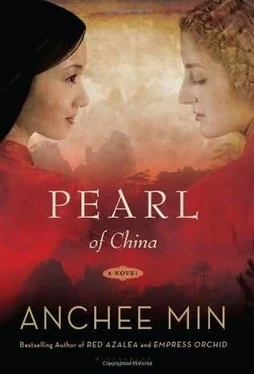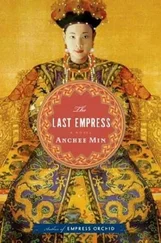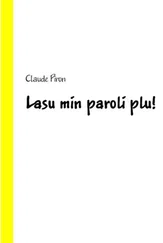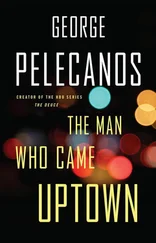
Anchee Min
Pearl of China
© 2009
I belong to China for I have lived there from childhood to adulthood… Happy for me that for instead of the narrow and conventional life of the white man in Asia, I lived with the Chinese people and spoke their tongue before I spoke my own, and their children were my first friends.
Pearl S. Buck
My Several Worlds
Behind the calm steadfast eyes of a Chinese woman, I feel a powerful warmth. We might have been friends, she and I, unless she had decided first that I was her enemy. She would have decided, not I. I was never deceived by Chinese women, not even by the flower-like lovely girls. They are the strongest women in the world. Seeming always to yield, they never yield. Their men are weak beside them. Whence comes this female strength? It is the strength that centuries have given them, the strength of the unwanted.
Pearl S. Buck
Letter from Peking
Before I was Willow, I was Weed. My grandmother, NaiNai, insisted that naming me Weed was better. She believed that the gods would have a hard time making my life go lower if I was already at the bottom. Papa disagreed. “Men want to marry flowers, not weeds.” They argued and finally settled for Willow, which was considered “gentle enough to weep and tough enough to be made into farming tools.” I always wondered what my mother would have thought if she had lived.
Papa lied to me about my mother’s death. Both he and NaiNai told me that Mother died giving birth. But I had already learned otherwise from neighbors’ gossip. Papa had “rented” his wife to the town’s “Bare-sticks” in order to pay off his debts. One of the bachelors got Mother pregnant. I was four years old when it happened. To rid her of the “bastard seed,” Papa bought magic root powder from an herbalist. Papa mixed the powder with tea and Mother drank it. Mother died along with the seed. It broke Papa’s heart, because he had intended to kill the fetus, not his wife. He had no money to buy another wife. Papa was angry at the herbalist, but there was nothing he could do-he had been warned about the poison.
NaiNai feared that she would be punished by the gods for Mother’s death. She believed that in her next life she would be a diseased bird and her son a limbless dog. NaiNai burned incense and begged the gods to reduce her sentence. When she ran out of money for incense, she stole. She took me to markets, temples, and graveyards. We would not act until darkness fell. NaiNai moved like an animal on all fours. She was in and out of bamboo groves and brick hallways, behind the hills and around ponds. Under the bright moonlight, NaiNai’s long neck stretched. Her head seemed to become smaller. Her cheekbones sharpened. Her slanting eyes glowed as she scanned the temples. NaiNai appeared, disappeared, and reappeared like a ghost. But one night she stopped. In fact, she collapsed. I was aware that she had been ill. Tufts of hair had been falling from her head. There was a rotten smell to her breath. “Go and look for your father,” she ordered. “Tell him that my end is near.”
Papa was a handsome man in his thirties. He had what a fortuneteller would describe as “the look of an ancient king” or “the matching energy of sky and earth,” meaning he had a square forehead and a broad chin. He had a pair of sheep eyes, a garlic-shaped nose that sat on his face like a gentle hill, and a mouth that was always ready to smile. His hair was thick and silky black. Every morning, he combed and braided it with water to make his queue smooth and shining. He walked with his back straight and head up. Speaking Mandarin with an Imperial accent, Papa wore his voice like a costume. But when Papa lost his temper, his voice would slip. People were shocked when Mr. Yee suddenly took up a strange voice. Ignoring NaiNai’s opinion that his ambitions would never be realized, Papa dreamed that one day he would work for the governor as an adviser. Papa attended teahouses where he showed off his talent in classic Chinese poems and verse. “I must keep my mind sharp and literary skills tuned,” he often said to me. One would never guess from the way he presented himself that Papa was a seasonal coolie.
We lived in Chin-kiang, a small town far away from the capital, Peking, on the south side of the Yangtze River in Jiangsu province. Originally, our family was from Anhui province, a harsh region where survival depended on an endless round of crushing physical labor. For generations my family worked the region’s thin and unfertile soil and struggled with famine, flood, locusts, bandits, and debt seekers. NaiNai bragged that it was she who brought “luck” to the Yee family. She was purchased by my grandfather when he was forty years old. No one was allowed to mention that the purchase took place in a local sing-song house. When NaiNai was in her prime, she had a slender figure, a swanlike neck, and a pair of fox eyes with both ends tilted up. She painted her face every day and modeled her hairstyle after the Imperial empress. It was said that men’s blood would boil when NaiNai smiled.
By the time the family crossed the Yangtze River and migrated to the south, NaiNai had given the Yee family three sons. Papa was the eldest and the only one sent to school. Grandfather expected a return from his investment. Papa was expected to become an accountant so that the family could fight the government’s tax collectors. But things didn’t turn out right-Grandfather lost his son to the education.
Papa believed that he was too good to work as a coolie. At sixteen, he developed the expensive habits and fantasies of the rich. He read books on China’s political reform and chewed tea leaves to sweeten his peasant garlic breath. An ideal life, he told others, would be to “compose poems under blossoming plum trees,” far away from the “greedy material world.” Instead of returning home, Papa traveled the country, making his parents pay the bills. One day he received a message from his mother. The message informed him that his father and brothers were gravely ill and near death from an infectious disease that had swept through his hometown.
Papa rushed home, but the funeral was already over. Soon enough, his house was possessed by the debt seekers. NaiNai and Papa fell into poverty and became coolies. Although NaiNai vowed to regain their former prosperity, she was no longer healthy. By the time I was born, NaiNai suffered from an incurable intestinal disease.
Papa struggled to keep his “intellectual dignity.” He continued to write poems. He even composed a piece titled “The Sweet Scent of Books” for my mother’s funeral. Invoking a newfound spirituality, he insisted that his words would make better gifts than jewelry and diamonds to accompany his wife in her next life. Although Papa was no different from a beggar in terms of possessions, he made sure that he was lice-free. He kept his appearance by trimming his beard and never missed a chance to mention his “honorable past.”
Papa’s honorable past didn’t mean anything to me. For the first years of my young life, food was the only thing on my mind. I would wake hungry every morning and go to sleep hungry every night. Sometimes the clawing in my stomach would keep me from sleeping. Having to constantly scavenge for scraps, I existed in a delirium. Unexpected luck or a good harvest might bring food for a while, but the hunger would always return.
By the time I was seven, in 1897, things had only gotten worse. Although NaiNai’s health had continued to deteriorate, she was determined to do something to better our lot. Picking up her old profession, she began to receive men in the back of our bungalow. When I was given a fistful of roasted soybeans, I understood that it was time to disappear. I ran through the rice paddies and the cotton fields into the hills and hid in the bamboo groves. I cried because I couldn’t bear the thought of losing NaiNai the same way I had lost Mother.
Читать дальше













